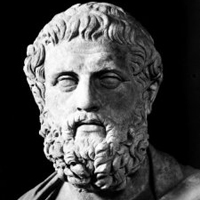Introduction of Sophocles' Antigone
Antigone, the last trilogy of Sophocles but written first in 442 BCE, centers on the conflict between Creon, the dictator of Thebes and the strong willed Antigone. The play has only one main plot and few developmental characters without any physical violence. There is the presence of battle between contradictory ideas and beliefs represented by Antigone and Creon.

Sophocles
The main issue of argument is the individual conscience versus the burdens of state. It is difficult to take sides between the individual's duty towards family and religion, and the obligations to the state. But, Antigone wins the battle in taking the favor of the audience as her actions are motivated by the family love and homage to the religion.
Sophocles' plays often deal with the specific struggle of a strong willed individual against fate. In this play, the issue has to do with the power of state versus the power of religion. In other words, the play centers on distinction between law and justice, or conflict between human law and divine law. Here, he depicts a resolute and heroic female protagonist who puts her individual free will against the intractable forces of fate and against the irrational and unjust laws of tyrannical man like Creon. He represents state law (human law) whereas Antigone represents divine law (religion). There is a kind of moral ambivalence, in a way, that Creon is a right and Antigone is not wrong. Antigone is of the opinion that the laws of God are superior to the laws of the state.
The play tries to explore what happens when divine laws come into conflict with state laws and power as well. We get the message that divinely ordained laws are still more important than the human laws made by the state. It is finely a balance tragedy because Antigone is unrelenting in a defiance of state power and so is Creon in his defiance of divine power.
Antigone emerged as a heroic heroine and presses for heard in the full conviction that she is right. Even if she must break the law of the state. She must answer for what she regards as a higher law. She has dared the crime of piety. She challenges Creon, so badly that her every move, coupled with Creon’s pride forces him to harden his position and set in motion the ultimate tragedy/ the loss of all he holds dear.
The main character of the play is Creon, who is characterized by both virtues and vices like he is sincere, patriotic and disciplinarian, but at the same time he is inflexible and narrow minded people. He is so persistent in his decision that he cannot see the drawbacks of it. He cannot realize his mistakes until it is too late. He is presented as the epitome of the figure who has a corrupting effect of the absolute power.
On the other hand, Antigone has a smaller role, but she leaves her great impressions on the audiences. She is taken as an immature lady to desire to martyr herself by some critics, but at the same time some judges her as a woman of having innate nobility and reluctant to compromise the truth. Antigone remains to be a revolutionary and powerful play, and has become the inspiration for generations of rebels and dissidents.
Antigone Study Center
Dramatic Irony in Sophocles' Antigone
Human Law and Law of God in Antigone
 |
bachelorandmaster.com |